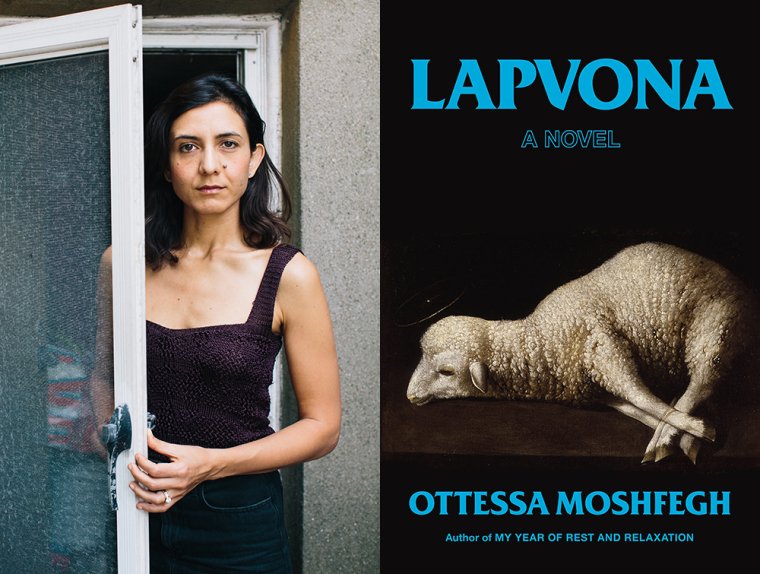This week’s installment of Ten Questions features Ottessa Moshfegh, whose novel Lapvona is out today from Penguin Press. Set in the eponymous medieval village of Moshfegh’s imagination, the story tracks the tribulations of thirteen-year-old Marek, a poor boy whose “ugly” exterior masks a pious soul, and his cruel father, Jude. Without a mother to love him, Marek has taken to cuddling up with the village’s witchy wet nurse, Ina. When an accident twists Marek’s fate, sending him to live with Lapvona’s selfish overlord, Villiam, the boy faces a crisis of faith. Now well fed and treated with less violence, Marek grows as Jude stagnates in worsening squalor in Lapvona—where few know that it is Villiam’s manipulations that keep them in such dire straits. Publishers Weekly calls Lapvona “a triumph.” In this dark tale, “Moshfegh brings her trademark fascination with the grotesque to depictions of the pandemic, inequality, and governmental corruption, making them feel both uncanny and all too familiar.” Moshfegh is the author of the novels Death in Her Hands, My Year of Rest and Relaxation, and Eileen, which won the PEN/Hemingway Award for debut fiction and was shortlisted for the National Book Critics Circle Award and the Man Booker Prize. She is also the author of a story collection, Homesick for Another World, and a novella, McGlue.

Ottessa Moshfegh, author of Lapvona. (Credit: Jake Belcher)
1. How long did it take you to write Lapvona?
It took me about a year from start to finish. I wrote the first draft at home during the COVID-19 pandemic lockdown. The most memorable part of the process was the first revision, which I did at the Ucross Foundation residency in Wyoming. I loved it there and can’t wait to go back.
2. What is one thing that surprised you during the writing of Lapvona?
I was surprised by how much I enjoyed writing in omniscient third-person point of view! All my other novels are in the first person, so this was a departure and a challenge. I was struck by the freedom of third person, how I could roam and jump and skip around, and cozy up to characters and then back away. It was really fun.
3. Where, when, and how often do you write?
I write at home in my bedroom. I don’t have any general restrictions on what time of day I write. When I am composing the first draft of a novel, I write daily. If I skip a day, I panic.
4. What are you reading right now?
I just got this book called Wonder, Horror, Mystery: Letters on Cinema and Religion in Malick, Von Trier, and Kieślowski which is a dialogue between the film critic J. M. Tyree and the art critic Morgan Meis. I haven’t cracked it yet, but I read an excerpt online and found it very alluring.
5. What is the earliest memory that you associate with this book?
In 2018 I had an inkling of my Lapvona narrative. I imagined a story in which a boy killed another boy, and the mourning parents decided that justice would only be served if they took that killer in as their replacement son. As for the medieval setting, I wrote a short story called “Brom” in 2012, which was published in Granta in 2017. It takes place in a medieval castle. It’s not a Lapvona story, but it was the first time I imagined a fiction set in that time period.
6. What is the biggest impediment to your writing life?
Zoom.
7. Outside of writing, what other forms of work were essential to the creation of Lapvona?
I did a little research. And I looked at some art. The most inspiring book was The Middle Ages in 50 Objects by Elina Gertsman and Barbara H. Rosenwein.
8. What trait do you most value in your editor (or agent)?
I am so blessed to have an editor and an agent who appreciate the ways in which my writing is distinctive. When I first connected with Scott Moyers at Penguin Press, it was about my novel Eileen. I remember he told me, “I get it!” And I believed him. He didn’t want me to change the nature of the book like some other editors did. He understood the project, and his notes were in service of my vision.
9. Who is your most trusted reader of your work and why?
I show my work to my friends Rosie Weinberg and Kristine McKenna, and to my husband Luke Goebel. They each offer insights peculiar to their tastes and personalities. Among the three of them, I can get a feel for how the work affects a reader.
10. What’s the best piece of writing advice you’ve ever heard?
In 2002 I went to St. Petersburg, Russia, to take a class with novelist Padgett Powell. One day he said something very simple, and I can’t believe I had never heard it before: “Write clearly.” That was it!







